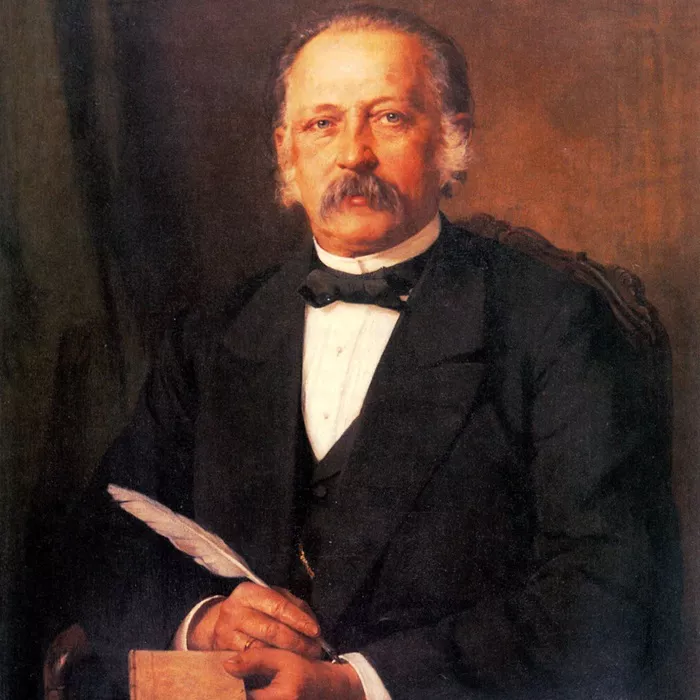
Theodor Fontane (1819–1898) is celebrated as one of Germany’s most influential poets and novelists, often associated with 19th-century Realism. Known for his mastery of language and acute social observations, Fontane captured the complexities of human relationships and societal norms. His works, ranging from evocative poems to groundbreaking novels, continue to shape literary discourse in Germany and beyond.
Theodor Fontane Biography
Theodor Fontane was born on December 30, 1819, in Neuruppin, Prussia. He hailed from a Huguenot family, a heritage that would later influence his works. Fontane’s early years were marked by modest beginnings. His father, Louis Henri Fontane, owned a pharmacy but faced financial instability, leading to a somewhat turbulent upbringing. Despite these challenges, Fontane’s intellectual curiosity was evident from a young age.
Fontane trained as a pharmacist, completing his apprenticeship in 1836. However, his passion for literature gradually overshadowed his interest in pharmacy. He began writing poetry and prose while working as a pharmacist, ultimately deciding to pursue a career in writing. In 1849, Fontane moved to Berlin, where he joined the literary scene and began contributing to various newspapers and journals.
Fontane’s early literary works reflected his travels and journalistic endeavors. His time in England (1852–1859) as a correspondent profoundly shaped his worldview. Immersed in English culture, Fontane developed an admiration for its history and literature, which later inspired works like Jenseit des Tweed, a travelogue about Scotland.
Returning to Germany, Fontane embraced the realist tradition. His novels and poems delved into the intricacies of Prussian society, exploring themes of honor, love, and moral dilemmas. Among his most famous novels is Effi Briest (1895), a tragic tale of a young woman trapped by societal expectations, often compared to works like Anna Karenina and Madame Bovary.
Fontane’s later years were marked by prolific writing and recognition as a leading literary figure. Despite health challenges, he continued to write until his death on September 20, 1898, in Berlin. His legacy endures as a cornerstone of German literature.
Theodor Fontane Poems
Fontane’s poetry, though less celebrated than his novels, offerrs profound insights into his artistry. Here are some notable poems:
1. “Archibald Douglas”
This ballad captures themes of loyalty and betrayal, reflectingFontane’s penchant for historical and dramatic storytelling.
2. “Herr von Ribbeck auf Ribbeck im Havelland”
One of Fontane’s most beloved works, this poem tells the taleof a benevolent squire whose generosity transcends death, highlighting themes of legacy and kindness.
3. “Gorm Grymme”
A historical ballad with Norse influences, exploring the concepts of deestiny and sacrifice.
4. “John Maynard”
A gripping ballad about a shipwreck and the heroism of a helmsmanwho sacrifices his life to save passengers, illustrating Fontane’s ability to blend narrativeand emotional depth.
5. “An der Spree”
A lyrical reflection on the beauty of Berlin’s Spree River, showcasing Fontane’s connection to his homeland.
6. “Im Grünen”
This poem celebrates the tranquility of nature, a recurring theme in Fontane’s lyrical works.
7. “Die Brück’ am Tay”
A tragic ballad recounting the collapse of the Tay Bridge in Socotland, combining historical events with dramatic flair.
8. “Graf Petöfy”
A narrative ballad exploring themes of love and revenge, underscoring Fontane’s mastery of storytelling.
9. “Berliner Leben”
A witty and observational piece capturing the vibrant life of Berlin in the 19th century.
10. “Abschied”
A poignant meditation on departure and loss, demonstratingFontane’s emotional depth.
Theodor Fontane Quotes
1. “A good aphorism is too hard for the tooth of time and is not worn away by all the centuries.”
2. “Life is uncertain; eat dessert first.”
3. “A person becomes great through their deeds, not their words.”
4. “Trust is the foundation of all great relationships.”
5. “The heart has reasons that reason cannot understand.”
6. “There is no salvation in perfection, only in humanity.”
7. “Happiness is not given; it is created.”
8. “Every path has its puddles.”
9. “Reality is often not what we wish, but what we must accept.”
10. “Only in the past is there truth, for the present is fleeting.”
Theodor Fontane Facts
1. Fontane was originally trained as a pharmacist before turning to literature full-time.
2. His Huguenot ancestry played a significant role in shaping his cultural identity.
3. Effi Briest is considered one of the greatest German novels and a cornerstone of literary Realism.
4. He worked as a war correspondent during the Austro-Pirussian and Franco-Prussian Wars.
5. Fontane was deeply influenced by his travels to England, whichbroadened his literary horizons.
6. His transition to writing novels began in his 50s, makinghim a late bloomer in fiction.
7. Fontane’s poetry often incorporated historical and folkloric theemes
8. He was one of the first German authors to portray strong, complex female protagonists.
9. Fontane’s works frequently critique the rigidity of Prussian socilety.
10. His travelogues remain valuable cultural and historical recordsof 19th-century Europe.
